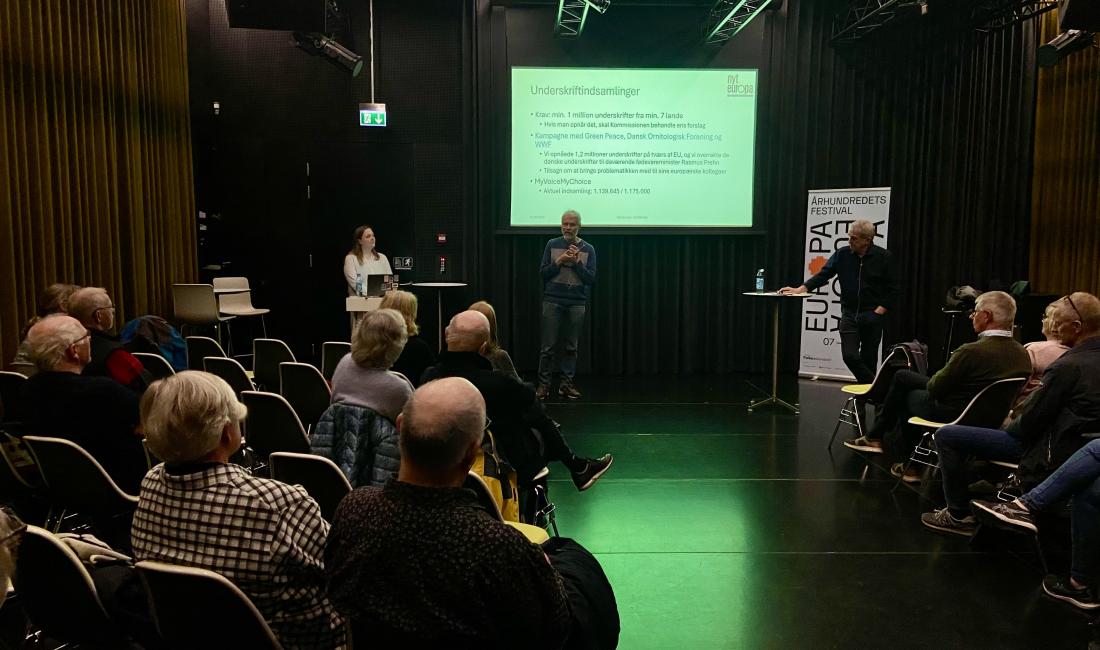The EU for Global project aims to foster democratic participation in the policies that will shape the future of the European Union within a global context. Implemented across eight countries—Bulgaria, Romania, Spain, Malta, Greece, Denmark, Germany, and Latvia—the project emphasises the role of the European Union on the global stage while reinforcing a shared sense of European identity and values.
A key objective of EU for Global is to bridge the gap between people living in the EU and its decision-makers, by ensuring their participation and contribution to EU policies addressing pressing global challenges. By engaging participants in meaningful dialogue, the project seeks to bridge gaps and create actionable strategies for a more resilient and inclusive Europe.
At the Century of Ideas Festival 2025 in Aarhus, Denmark, Nyt Europa participated in the EU4Global project, with a Citizens' Panel moderated by Steen Gade. The Panel focused on the possibilities for citizens’ influence in EU policymaking.
What are the actual possibilities for influence for European citizens?
We focused on the different possibilities for influence that exist in the EU, both as citizens' contact with the European institutions, as citizens' contact with politicians, and as organisations that are part of the decision-making process. The event was held as part of our project, EU4Global, in which we host knowledge events and citizen assemblies focused on involving citizens in decision-making processes.
Citizen proposals and citizen assemblies
The participating citizens were presented with examples of how a citizen proposal can go from a signature collection to real influence, including with a focus on the signature collection that Nyt Europa participated in together with Greenpeace, the Danish Ornithological Society and WWF, where 1.2 million signatures were collected at the European level. We also presented the citizen assemblies that are held in connection with the EU4Global project, and the citizen assemblies we have held under our previous project, REAL DEAL.
The informal channels
We also talked about the informal possibilities for influence, for example, when Nyt Europa in 2019 was in Berlin in connection with the projects History of Optimism and Young Europe. Here, one of Nyt Europa’s young participants had the opportunity to take part in a debate about civil society in Europe, had a private conversation with Ursula von der Leyen, and was subsequently invited to dinner with Angela Merkel. The young participant handed over a youth manifesto prepared by a group of young people in the Young Europe project. This type of influence is something Nyt Europa works a great deal with, where we, based on citizen assemblies and activities, write manifestos and reports, which we can later present to politicians.
Can we see the possibilities – or does it all seem hopeless?
Several of the participants expressed that they were not aware of all the forms of influence, and were not aware of the possibility, for example, to sign European citizen proposals and take part in citizen assemblies via EU-sponsored projects. We talked with the participants about how the EU is closer than you might think, and that we need to remember to make use of the EU. The EU can do a lot – if we are just willing to let the possibilities in. Several of the participants expressed that they find the EU system complicated and that it seems to be for the insiders. If you don’t know where to find the different possibilities, then you won’t find them.
After the Citizens' Panel, the participants came together to propose a set of policy recommendations:
1. Improve transparency throughout decision-making cycles
The EU should introduce mechanisms that allow citizens to clearly follow where proposed policies are in the decision process. Information portals or dashboards could show which stage a proposal is at, what the next steps are, and timelines for decisions. This should go further than the existing tools there are, which are often not updated and hard to follow.
2. Strengthening citizens’ access
Ensure that ordinary citizens know how to engage with EU policymaking. This means better communication about opportunities for influence (consultations, feedback rounds), guidance and more accessible public hearings.
3. Increase openness of public hearings
EU institutions must make public consultations more transparent: when they happen, how to find them, how input is used, and the outcomes. Provide summaries of the results.
4. Demonstrate that citizen input has an impact
The EU should show concrete examples of how citizen contributions have changed or shaped policy. Tell people what was done with their input, why certain suggestions were not adopted, etc.
5. Make processes feel closer and accessible
This could involve local outreach, frequent public events where citizens can meet MEPs or Commissioners or digital platforms that allow direct engagement with EU representatives.
Find the recommendations from the other Citizens' Panels across Europe here.




